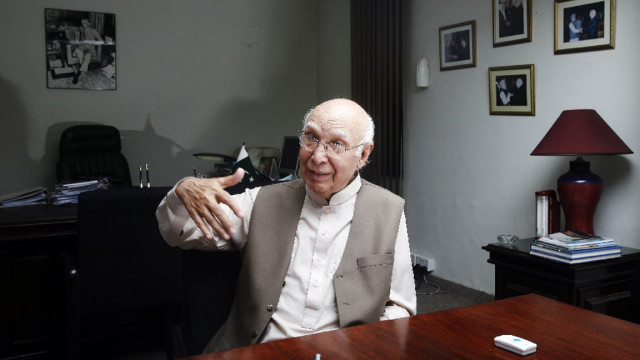Diplomatic row: Sartaj denies meddling in BD’s internal affairs
Pakistan has only ‘expressed concern’, says adviser to prime minister.

Adviser to the Prime Minister on Foreign Affairs Sartaj Aziz. PHOTO: REUTERS/FILE
Pakistan is merely “expressing concern” over the execution of Abdul Qadir Molla, the adviser to the Prime Minister on Foreign Affairs Sartaj Aziz said, responding to accusations that the adoption of a resolution condemning the hanging was tantamount to interference in Bangladesh’s internal affairs.
Winding up a debate on Pakistan’s recent foreign policy decisions during the Senate session on Wednesday, the minister was replying to opposition senators’ accusations that the government had demonstrated “double standards” in its reaction to the incident in Bangladesh.
PPP Senator Raza Rabbani pointed out that the interior minister favoured a resolution in the national assembly while the foreign office issued a statement maintaining that the issue pertains to Bangladesh’s internal affairs. Pakistan maintains the policy of non-interference in the internal matters of Bangladesh or any other country, reiterated Aziz. “We are only concerned as we do not want violence to escalate there and we do want friendly relations with Bangladesh,” said Aziz. However, Pakistan’s parliament was sovereign and the foreign office cannot dictate which resolutions the assembly could pass.

New strategic depth
Aziz told senators that Pakistan’s government was firm in its stance that a solution to Afghanistan’s problem would be “intra-Afghanistan”. He said Pakistan has no policy of “strategic depth” in Afghanistan. “I think Pakistan is now becoming Afghanistan’s strategic depth,” he said. Pakistan has encouraged a post-2014 peace agreement between the US and Afghanistan, “but we never influence or forced Afganistan on it.”
National security policy
Aziz also told the house that the government has put in action a plan to evolve a mechanism for national security policy making. The national security policy would be devised by a cabinet body with ministerial level representation and through the participation of think tanks. The body would also have representation from the military leadership. Never before in Pakistan has such a mechanism where both civilian and military leadership could jointly monitor, evaluate and plan national security existed, Aziz added.
He said he hoped that composite dialogue with India would resume soon.
Published in The Express Tribune, December 19th, 2013.



















COMMENTS
Comments are moderated and generally will be posted if they are on-topic and not abusive.
For more information, please see our Comments FAQ